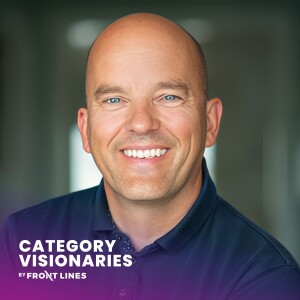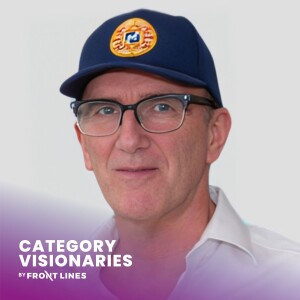BUILDERS
Welcome to BUILDERS — the show about how founders get new technology adopted.
Each episode features a founder on the front lines of bringing new tech to market, sharing how they broke into their industry, earned early believers, built credibility, and unlocked real technology adoption.
BUILDERS is part of a network of 20 industry-specific shows with a library of 1,200+ founder interviews conducted over the past three years.
For the full network, visit FrontLines.io.
Brought to you by:
www.FrontLines.io/FounderLedGrowth — Founder-led Growth as a Service. Launch your own podcast that drives thought leadership, demand, and most importantly, revenue.
Episodes

Tuesday Nov 26, 2024
Tuesday Nov 26, 2024
Pier is revolutionizing credit infrastructure by enabling companies to launch compliant credit products through their API-first solution. Having raised $2.5M from notable investors including Y Combinator, Airbnb, OpenAI, Experian, and Morgan Stanley, Pier is transforming how businesses offer innovative credit solutions to their users. In this episode of Category Visionaries, Jessica Zhang shares her journey from identifying a critical market need at her previous company to launching Pier in 2023 and securing their first major customer within just four weeks.
Topics Discussed:
Building an API-first solution for compliant credit products
The evolution from identifying market pain points to product development
First principles approach to reimagining credit infrastructure
Strategy for landing enterprise customers with 80k+ ARR deals
The role of compliance in credit infrastructure
Vision for democratizing access to credit through trusted brands
GTM Lessons For B2B Founders:
Leverage previous company experience: Zhang and her co-founder's insights from their time at Stilt gave them unique competitive advantages in understanding customer pain points. Sometimes the best startup ideas come from seeing unfinished business or unsolved problems at previous companies rather than a single "aha" moment.
Focus on high-quality early customers: Pier specifically targets customers who are leaders in their respective categories, focusing on companies with 4.5+ star ratings and strong growth trajectories. This creates a "golden standard" playbook that can be replicated across similar verticals, making future sales much easier.
Embrace organic growth channels: Despite having no dedicated sales or marketing team, Pier achieved significant growth through word-of-mouth referrals from satisfied customers and investors. They prioritized genuine in-person conversations at industry conferences over cold outreach.
Move fast despite obstacles: The founders didn't let perfect timing dictate their launch. Despite missing YC batch deadlines and personal commitments, they moved forward because they had validated customer demand. Their ability to secure their first customer within four weeks validated this approach.
Build for specific pain points: Instead of creating a general solution, Pier focused heavily on the compliance aspect of lending infrastructure after identifying it as the most painful and challenging part for potential customers through extensive market research and conversations.
//
Sponsors:
Front Lines — We help B2B tech companies launch, manage, and grow podcasts that drive demand, awareness, and thought leadership.
www.FrontLines.io
The Global Talent Co. — We help tech startups find, vet, hire, pay, and retain amazing marketing talent that costs 50-70% less than the US & Europe.
www.GlobalTalent.co

Tuesday Nov 26, 2024
Tuesday Nov 26, 2024
Canopy, an API-first loan management and servicing platform, has raised over $30 Million to revolutionize how companies manage and service loans. In this episode of Category Visionaries, Matt Bivons shares his journey from designer to founder, and how Canopy is transforming loan servicing from a cost center into a profit center. With over five years of experience serving B2B lenders, Canopy's platform enables companies to create flexible, personalized lending products while maintaining robust infrastructure for loan management.
Topics Discussed:
Evolution of Canopy from a student credit card concept to an enterprise loan servicing platform
The challenges of building infrastructure for financial services
Product-led growth in B2B enterprise software
The journey from designer to marketer to founder
Market segmentation and category creation in fintech
The transition from consumer to B2B lending focus
Development of "intelligent servicing" through AI and ML
GTM Lessons For B2B Founders:
Embrace market signals for pivots: Matt initially planned to build a student credit card but pivoted to loan servicing infrastructure after recognizing stronger market demand. He shares, "I realized at that moment that was the market pool, that was the signal that was saying I need to pivot." B2B founders should remain attuned to market feedback and be willing to adapt their vision accordingly.
Find your wedge by going deeper: When Canopy eliminated 50% of their sales pipeline by cutting consumer lending, it enabled deeper penetration into B2B markets. Matt explains, "We were just spread way too thin, and we needed to go a lot deeper in the market that we're being pulled into." B2B founders should consider strategic trade-offs between market breadth and depth.
Validate distribution assumptions: Matt learned that self-serve "lending as a service" attracted the wrong customers and complicated pricing. He notes, "It attracted the wrong type of customer... charging per API call is very confusing to most people when you're dealing with lending." B2B founders should thoroughly test go-to-market assumptions before scaling.
Build trust through education: Canopy discovered that most sales cycles take about a year and require building deep trust. Matt emphasizes, "The combination of content marketing and direct sales, which is all about building trust, is where we are right now." B2B founders should invest in educational content and relationship building for complex sales.
Segment your market precisely: Canopy analyzes their market by both vertical (logistics, healthcare, etc.) and horizontal loan types (revolving credit, merchant cash advance, etc.). Matt explains, "If the verticals are the business model, the loan type is the horizontal that goes across them." B2B founders should develop detailed market segmentation to guide product and GTM strategy.
//
Sponsors:
Front Lines — We help B2B tech companies launch, manage, and grow podcasts that drive demand, awareness, and thought leadership.
www.FrontLines.io
The Global Talent Co. — We help tech startups find, vet, hire, pay, and retain amazing marketing talent that costs 50-70% less than the US & Europe.
www.GlobalTalent.co

Monday Nov 25, 2024
Monday Nov 25, 2024
After 25 years in payments, including leading roles at Braintree and PayPal, Klas Bäck noticed a persistent problem: companies were leaving money on the table due to suboptimal payment infrastructure. Despite being data-driven in other areas, even billion-dollar companies made payment decisions without complete, accurate, or timely data. This revelation led him to co-found Pagos, raising $44M to build a payment operations platform that helps enterprise companies optimize their payment performance through better data and analytics.
Topics Discussed:
Evolution of payments from a corporate banking afterthought to a product/engineering priority
The opaque nature of payment operations and the industry-wide lack of data-driven decision making
Why payment infrastructure optimization remains challenging despite technological advances
The emergence of payment operations as a distinct category within enterprise companies
Building a global enterprise SaaS company from day one
The impact of market noise on B2B marketing strategies
Community building through intimate dinner events and industry conferences
GTM Lessons For B2B Founders:
Break into enterprise through brute force outreach: Bäck leveraged his LinkedIn network to systematically reach out to potential customers, focusing on companies with $50M+ in annual online sales. The key was having enough industry credibility to secure initial conversations.
Adapt your MVP strategy for enterprise: When building features for early adopters, start with manual processes (like weekly data files) before investing in full automation. This allows you to validate value while managing development costs.
Build community through peer connections: Rather than focusing on selling, create opportunities for prospects to meet peers facing similar challenges. Bäck found success hosting intimate dinners (10-12 people) where the value came from peer networking rather than vendor pitching.
Embrace imperfect execution: In startup environments, waiting for perfection can be fatal. Launch quickly, stay close to early customers, communicate transparently about issues, and iterate based on feedback.
Hire for curiosity and action-orientation: Look for team members who proactively take initiative in group settings and demonstrate genuine curiosity through question-asking. These traits are especially crucial in early-stage startups.
Focus marketing on high-intent channels: Traditional demand generation tactics like Google Ads may not work well for new categories. Instead, focus on building presence in existing industry communities and conferences where your target buyers already gather.
//
Sponsors:
Front Lines — We help B2B tech companies launch, manage, and grow podcasts that drive demand, awareness, and thought leadership.
www.FrontLines.io
The Global Talent Co. — We help tech startups find, vet, hire, pay, and retain amazing marketing talent that costs 50-70% less than the US & Europe.
www.GlobalTalent.co

Friday Nov 22, 2024
Friday Nov 22, 2024
ATLAS Space Operations is transforming how satellite operators communicate with their space assets through their innovative ground software as a service platform. With over $37 Million in funding, ATLAS has evolved from providing basic antenna infrastructure access to delivering a comprehensive cloud-based solution that enables satellite operators to efficiently retrieve data from space. In this episode of Category Visionaries, Brad Bode shares the company's journey from a bootstrapped startup to becoming a leader in both government and commercial space communications.
Topics Discussed:
Evolution from ground station as a service to ground software as a service
Building a dual commercial and government business model
The growth trajectory of the space industry
Navigating complex government procurement processes
Future of space communications technology
The role of software in modernizing space infrastructure
GTM Lessons For B2B Founders:
Build a Two-Year Government Sales Runway: Brad emphasizes, "You must anticipate that it will take longer than you think. If you have a six month runway, that's not going to do it." B2B founders targeting government contracts need at least a two-year runway unless they have robust commercial revenue to sustain operations.
Start Small with Government Contracts: "The best way to start accessing government money and making the government aware of who you are as a company is probably through these small business initiatives," Brad notes. Success in government sales requires starting with smaller contracts ($1-2M) to build credibility and past performance credentials.
Develop Agency-Specific Strategies: "Each agency has been making it easier to bid on those programs," Brad shares. Different government agencies have distinct procurement processes and requirements. Success requires understanding and adapting to each agency's unique approach.
Balance Commercial and Government Revenue: Brad explains their 50-50 revenue split between government and commercial, with government projected to reach 80%. Having both streams provides stability and multiple growth paths.
Prioritize In-Person Relationships: As Brad's team says, government sales is "a contact sport." Traditional B2B marketing tactics don't work - success requires building relationships through in-person meetings and industry events: "There's no amount of Google Adwords you could do to help you with the government."
//
Sponsors:
Front Lines — We help B2B tech companies launch, manage, and grow podcasts that drive demand, awareness, and thought leadership.
www.FrontLines.io
The Global Talent Co. — We help tech startups find, vet, hire, pay, and retain amazing marketing talent that costs 50-70% less than the US & Europe.
www.GlobalTalent.co

Thursday Nov 14, 2024
Thursday Nov 14, 2024
Torch Dental is revolutionizing the dental supply chain with a digital-first platform that's raised $49.5M in funding. The company is transforming how dental practices manage, order, and budget their supplies through a technology-driven approach that provides transparency and efficiency in an industry traditionally resistant to change. In this episode of Category Visionaries, Khaled Boukadoum shares insights from Torch Dental's journey from door-to-door sales in Manhattan to a nationwide platform serving dental practices across 48 states.
Topics Discussed:
The origins of Torch Dental and identifying supply chain inefficiencies
Evolution from field sales to digital-first acquisition
Building and scaling marketing operations in a traditional industry
Competing with established incumbents through technological innovation
Geographic expansion strategy and future growth plans
GTM Lessons For B2B Founders:
Start with Deep Problem Understanding: Khaled's journey began by deeply understanding the dental practice ecosystem through his sister's experience. As he explains, "She kind of came out of school after years and years of clinical training... and really isn't much training on [running a practice]." This firsthand exposure to the market need helped shape their solution.
Embrace High-Touch Product Development: Early success came from direct customer interaction. As Khaled notes, "We actually went and started knocking on doors in New York... we'd sign up a few practices, and then we'd run back to our office and we'd actually start chatting with our CTO and kind of make adaptations or changes to the product." This rapid feedback loop was crucial for product-market fit.
Demonstrate Clear ROI for Traditional Industries: When selling to technology-resistant industries, value proposition must be unmistakable. As Khaled shares, "You really have to make sure the value prop is super clear and the ROI to the customer is apparent and materially better for them in order for them to adopt the tech."
Leverage Data for Personalized Sales: Torch built what they call "pre-torch analytics" which, as Khaled describes, allows them to "create a whole custom demo for them, showing them how much they could save on exactly the same products." This data-driven approach makes the value proposition concrete and personalized.
Focus Marketing Efforts on Measurable Outcomes: On marketing strategy, Khaled emphasizes, "We've learned to be super metrics focused... to be really focused on kind of demand capture and demand gen opposed to more of kind of just general brand level marketing." This approach ensures marketing spend generates tangible results.
Choose Strategic Expansion Channels: Understanding where your customers are is crucial. As Khaled explains, "We're focused exclusively on dental practices at this stage. So we know who our customer is, we know where they live, and we're just really targeted in our approach on how to communicate with that and where to communicate with them."
//
Sponsors:
Front Lines — We help B2B tech companies launch, manage, and grow podcasts that drive demand, awareness, and thought leadership.
www.FrontLines.io
The Global Talent Co. — We help tech startups find, vet, hire, pay, and retain amazing marketing talent that costs 50-70% less than the US & Europe.
www.GlobalTalent.co

Thursday Nov 14, 2024
Thursday Nov 14, 2024
illumex is pioneering the future of enterprise data access through their generative semantic fabric platform, which enables self-service data analytics for every employee within large organizations like banks, insurance companies, and pharma corporations. In a recent episode of Category Visionaries, Inna Sela shared how with $13 Million in funding, illumex is transforming how business users interact with enterprise data by providing a ChatGPT-like experience that's hallucination-free, governed, and fast.
Topics Discussed:
The evolution of illumex's go-to-market strategy from targeting unicorn startups to enterprise customers
Creating a new category called "generative semantic fabric"
Building a complete platform offering versus selling individual features
Content-driven marketing strategy focused on thought leadership
The role of controversial opinions in driving market education
Strategic importance of in-house marketing expertise
Leveraging corporate venture capital for distribution channels
GTM Lessons For B2B Founders:
Adapt to market conditions: When Inna saw the 2022 downturn affecting their initial target market of software unicorns, she pivoted to enterprise customers. This required starting with paid POCs and gradually working up to larger deals with major corporations.
Category creation requires patience: Inna recognized from day one they were creating a new category. As she explained, "I was aware it's category creation... But for the sake of fundraising, I had to bring those parallels... so I was trying to bring these parallels to existing tools for investors to understand where we are."
Build for enterprise scale: Inna shares, "For the offering that we provide to companies like the augmented data management and access, you really need to have small Swiss panel. So it's not enough to have just one fork or one component of the Swiss knife, you really have to have full offering which is minimal."
Take controversial positions: Rather than making incremental improvements, Inna advocated for a completely different approach to data management. "I actually thought it's a benefit to have controversial opinions and to some extent differentiate product because this is how you make change," she explains.
Blend investor expertise: "You really need to have a blend of investors with different appetite and different business acumen so it can serve you on hiring, on reach out on different aspects of investors value add," Inna advises about fundraising strategy.
//
Sponsors:
Front Lines — We help B2B tech companies launch, manage, and grow podcasts that drive demand, awareness, and thought leadership.
www.FrontLines.io
The Global Talent Co. — We help tech startups find, vet, hire, pay, and retain amazing marketing talent that costs 50-70% less than the US & Europe.
www.GlobalTalent.co

Monday Nov 11, 2024
Monday Nov 11, 2024
FYLD has raised $48M to transform how infrastructure field workers execute their daily tasks safely and efficiently. In a recent episode of Category Visionaries, I spoke with Shelley Copsey, CEO and Co-Founder of FYLD, about creating a new category in field work execution and building during a pandemic. The company has achieved 3x ARR growth last year and is on track to double bookings revenue this year, with near-zero churn rates.
Topics Discussed:
The daily challenges of infrastructure field workers in utilities, roads, and railways
Creating and capturing demand in a new software category
Enterprise sales strategy in the infrastructure sector
Scaling during COVID with remote customer discovery
The reality of labor shortages in field operations
Building customer trust in critical infrastructure
GTM Lessons For B2B Founders:
Rethink conventional wisdom on market problems: While many discuss a labor shortage in field operations, FYLD's data shows 30-35% standing time across companies. Shelley explains, "I'm not convinced that there is a labor crisis... when you begin to look at that level of standing time, I think you've got to question if we've got a labor shortage or we've just got a problem of understanding what the people in the field are doing." Sometimes the most discussed market problem isn't actually the root cause.
Design pricing models that encourage full adoption: FYLD shifted from per-seat licensing to enterprise-wide deals after realizing usage limitations undermined platform value. Shelley notes, "If what your premise is by collecting large volumes of data, you can help people do their jobs better and more efficiently, your go-to-market model can actually undermine delivering the benefit from the platform." Pricing should align with your product's value creation mechanism.
Leverage industry-specific collaboration dynamics: In infrastructure, safety improvements aren't viewed as competitive advantages but as shared responsibilities. As one CEO told Shelley, "If you can help me keep workers safer, more mums and dads are going to think that this is a good career for their kid... if we can all keep people safer, we're all going to be able to grow as an industry." Understanding these dynamics can accelerate market penetration through referrals.
Navigate complex stakeholder alignment: Enterprise sales in infrastructure require buy-in from COOs, heads of safety, CIOs, and CFOs. Shelley shares, "Enterprise sales cycles are well known to take 9, 12, 15 months. In the infrastructure industry, we're moving a bit quicker than that." Success requires systematically addressing each stakeholder's priorities while maintaining momentum.
Build for end-users first: FYLD maintains an 8/10 customer satisfaction score among field workers, unprecedented in their industry. Shelley emphasizes, "There's no point going out and selling a product related to fieldwork if the field workers hate using the platform and won't adopt it." In B2B, while buyers sign the checks, end-user adoption drives long-term success.
//
Sponsors:
Front Lines — We help B2B tech companies launch, manage, and grow podcasts that drive demand, awareness, and thought leadership.
www.FrontLines.io
The Global Talent Co. — We help tech startups find, vet, hire, pay, and retain amazing marketing talent that costs 50-70% less than the US & Europe.
www.GlobalTalent.co

Monday Nov 11, 2024
Monday Nov 11, 2024
Welcome to another episode of Category Visionaries — Funding the Future. In today's episode, we're speaking with Susan Liu, Partner at Uncork Capital, a seed-stage venture capital firm investing out of a $200 Million fund.
Here are the most interesting points from our conversation:
Shift to Seed-Stage Investing: Susan transitioned from later-stage investing at Scale Venture Partners to focusing on seed-stage at Uncork Capital, driven by her passion for working with founders at the earliest stages of their journey.
State of Enterprise Software: The current enterprise software market is challenging, with traditional SaaS seeing budget constraints. However, AI-driven solutions are gaining traction, often backed by separate AI budgets within enterprises.
AI Investment Strategy: While there’s a surge in AI startups, Susan emphasizes the importance of founder-market fit and differentiation, as many companies are tackling similar problems in the AI space.
Evaluating Early-Stage Startups: Susan looks for a strong founding team with market experience, a large addressable market, and a compelling product wedge when evaluating seed-stage opportunities.
Traits of Successful Founders: Founders with deep industry experience, grit, and the ability to learn quickly tend to have a higher success rate, particularly in B2B markets.
Advice for Series A: For seed-stage founders preparing for Series A, Susan advises demonstrating strong revenue growth and capital efficiency, as these are key factors that attract investors in the current market.
//
Sponsors:
Front Lines — We help B2B tech companies launch, manage, and grow podcasts that drive demand, awareness, and thought leadership.
www.FrontLines.io
The Global Talent Co. — We help tech startups find, vet, hire, pay, and retain amazing marketing talent that costs 50-70% less than the US & Europe.
www.GlobalTalent.co

Wednesday Nov 06, 2024
Wednesday Nov 06, 2024
MIC Global, backed by $13 Million in funding, is revolutionizing the insurance industry through embedded microinsurance solutions. In this episode of Category Visionaries, Co-Founder Harry Croydon shares his journey from launching one of the first cyber insurance companies in 1999 to building a global embedded insurance platform that meets the evolving needs of the digital economy.
Topics Discussed:
The evolution of insurance technology from 1999 to present
Surviving the dot-com bubble and post-9/11 market challenges
The emergence of embedded microinsurance as a new category
Building a global insurance infrastructure
Multi-channel distribution strategy through brokers and insurance partners
//
Sponsors:
Front Lines — We help B2B tech companies launch, manage, and grow podcasts that drive demand, awareness, and thought leadership.
www.FrontLines.io
The Global Talent Co. — We help tech startups find, vet, hire, pay, and retain amazing marketing talent that costs 50-70% less than the US & Europe.
www.GlobalTalent.co

Wednesday Nov 06, 2024
Wednesday Nov 06, 2024
Homeward, a healthcare technology company that's raised over $70M, is pioneering a new approach to rural healthcare delivery by combining technology with in-person care. In this episode of Category Visionaries, Amar Kendale, President and Co-Founder of Homeward shares how the company is addressing the 23% higher mortality rate in rural America through an innovative care delivery model and technology platform.
Topics Discussed:
Homeward's evolution from initial hypothesis to market-validated solution
The unique challenges of healthcare delivery in rural communities
Building trust in healthcare through local partnerships
Technology's role in scaling healthcare access
Value-based care implementation and criticism
Market entry strategy for healthcare technology companies
GTM Lessons For B2B Founders:
Start with Operations, Not Technology: Amar emphasizes the importance of avoiding the "technologist's trap" of building before understanding. As he notes, "There's a trap a lot of technologists fall into... you have a vision for the way that technology can play a role, and you decide to start building first before you really know whether it's exactly the right problem or not." Instead, Homeward built minimal technology initially, embedding their tech team with clinicians to understand workflows before building solutions.
Challenge Initial Assumptions Through Market Testing: Homeward's early hypothesis about rural healthcare needs was incorrect. They assumed people without regular doctor visits needed primary care, but discovered that rural patients had doctors for acute care—they needed supplemental services for preventive care. As Amar explains, "What's different about the way people are consuming healthcare in rural is the thing we have to pay attention to."
Build Trust Through Local Presence: In healthcare, trust is paramount and historically local. Homeward succeeded by hiring local medical assistants and community health workers who understand the communities. "They have a really high degree of cultural competency. They are ambassadors for the Homeward brand... who can help us to spread that message," Amar shares.
Choose Strategic Markets for Scale: When selecting initial markets, Homeward focused on states with large Medicare populations to ensure sufficient scale. "You could easily die by a thousand cuts if you go after too small a market," Amar explains. Their success in Michigan and Minnesota created a template for future market expansion.
Design for Multiple Stakeholders: Healthcare technology requires satisfying multiple stakeholders—patients, providers, and payers. Amar warns, "If you focus on the patient and the payer and you leave out the provider, well, you may never get prescribed and you may never show up in the provider workflow." Successfully navigating this complexity creates defensive moats against competitors.
Partner with Long-Term Vision Aligned Investors: Homeward chose investors who shared their vision for transforming rural healthcare. Their lead investor, General Catalyst, pushed them to think bigger: "We were sheepishly sketching out the path to being a billion dollar business. And Hemant added the zero. He said this is easily a $10 billion business."
Focus on Early Validation and Responsible Growth: Despite rapid expansion (3-4x annual growth), Homeward maintains disciplined growth. Their approach is validated by an 80 NPS score, which Amar notes is "better than we ever did at Livongo or any other place we've been."
//
Sponsors:
Front Lines — We help B2B tech companies launch, manage, and grow podcasts that drive demand, awareness, and thought leadership.
www.FrontLines.io
The Global Talent Co. — We help tech startups find, vet, hire, pay, and retain amazing marketing talent that costs 50-70% less than the US & Europe.
www.GlobalTalent.co


